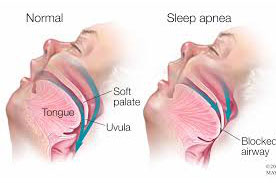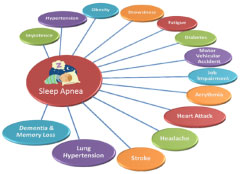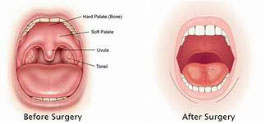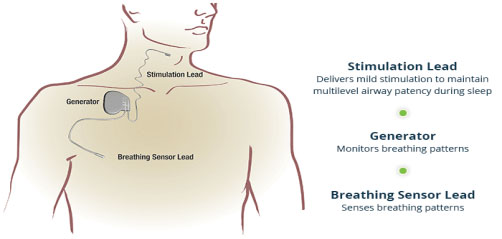What is sleep apnea?
 Sleep apnea, a serious sleep disorder, is when your throat muscles intermittently relax and block your airway during sleep for short periods of time. It can cause severe daytime sleepiness. If it's not treated, severe sleep apnea may be associated to high blood pressure, stroke, diabetes, depression and heart attack.
Sleep apnea, a serious sleep disorder, is when your throat muscles intermittently relax and block your airway during sleep for short periods of time. It can cause severe daytime sleepiness. If it's not treated, severe sleep apnea may be associated to high blood pressure, stroke, diabetes, depression and heart attack.
Sleep apnea affects about 6% of men and 3 % of women and 1-2% of children.
There are three types of sleep apnea: obstructive sleep apnea, central apnea and a combination of the two, called mixed sleep apnea.
The most common type is obstructive sleep apnea.
What are the symptoms of sleep apnea?
- Fatigue or sleepiness
- Gasping or choking at night
- Witnessed breathing pauses during sleep
- Loud snoring
- Morning headaches
- Restless sleep
- Unrefreshed sleep
- Insomnia with or without frequent awakenings.
- Frequent nighttime restroom trips.
- Difficulty concentrating or memory impairment
- Moodiness or Depression
- High blood pressure
- Heart disease
- Stroke
- Decreased libido
What are risk factors for sleep apnea?
- Excess weight. As fat deposits around the upper airway may obstruct the flow of breathing; however, not everyone with obstructive sleep apnea is overweight. Thin people can develop the disorder, too.
- High blood pressure. Obstructive sleep apnea is relatively common in people with hypertension.
- Diabetes. Obstructive sleep apnea may be more common in people with diabetes.
- Sex. In general, men are twice as likely as women to have obstructive sleep apnea.
- A family history of sleep apnea. If your family members have obstructive sleep apnea, you may be at an increased risk.
- Asthma. Recent research has found an association between asthma and the risk of obstructive sleep apnea.
- Low testosterone. Recent research has found an association between low testosterone and the risk of obstructive sleep apnea.
- Poly cystic ovary syndrome. Recent research has found an association between poly cystic ovary syndrome and the risk of obstructive sleep apnea.
What are complications of untreated sleep apnea?

- High blood pressure. If you already have high blood pressure, sleep apnea can make it worse. When you wake up often during the night, your body gets stressed. That makes your hormone systems go into overdrive, which boosts your blood pressure levels.
- Heart disease. People with OSA are more likely to have coronary artery disease, heart attack, and abnormal heart rhythms, such as atrial fibrillation. The causes may be dropped oxygen or/ and the stress from frequent awakenings. Untreated sleep apnea could lead to a sudden death from a cardiac event.
- Diabetes. Sleep apnea is common among people with this condition. Obesity raises a person’s risk for both disorders. Although studies haven’t shown a cause-and-effect link between sleep apnea and type 2 diabetes, not getting enough shut-eye can keep your body from using insulin properly, which leads to diabetes.
- Stroke. The study has found that men with moderate to severe sleep apneas about three times more likely to have stroke than men with mild or no sleep apnea.
- Depression. The study has found obstructive sleep apnea is probably associated with major depression.
- Weight gain. pounds raise your chances of getting sleep apnea, and the condition also makes it harder to slim down.
-
Complications with medications and surgery. Obstructive sleep apnea also is a concern with certain medications and general anesthesia. These medications, such as sedatives, narcotic analgesics and general anesthetics, relax your upper airway and may worsen your obstructive sleep apnea. People with obstructive sleep apnea may be more prone to complications after surgery.
- Eye problems. Some research has found a connection between obstructive sleep apnea and certain eye conditions, such as glaucoma.
What are the symptoms of sleep apnea?
- CPAP (continuous positive airway pressure)
The most common treatment is the use of CPAP device. A CPAP Machine is a breathing machine for Sleep Apnea and uses air pressure to keep your airway open during sleep.

- Oral Appliances (sleep Apnea Mouthpieces).
Though positive airway pressure is often an effective treatment, oral appliance can be an alternative for some people with mild or moderate obstructive sleep apnea. These devices are designed to keep your throat open.

- Surgery
Surgery is usually considered only if other therapies haven't been effective or haven't been appropriate options for you. Surgical options may include: - Weight management
Lose weight if you're overweight.
oUvulopalatopharyngoplasty (UPPP)
It is a procedure in which your doctor removestissue from the back of your mouth and top of your throat. Your tonsils and adenoids may be removed as well if they are enlarged.

oJaw surgery (maxillomandibular advancement)
This new device is approved for use in people with moderate to severe obstructive sleep apnea who can't tolerate CPAP. A thin impulse generator is implanted under the skin in the upper chest. If the device detects your breathing patterns and it will stimulate the nerve that controls movement of the tongue, pushing the tongue slightly forward to open the airway.









